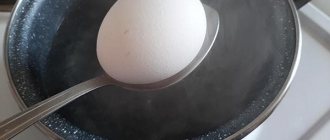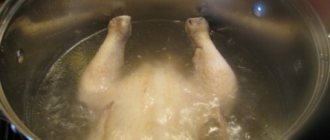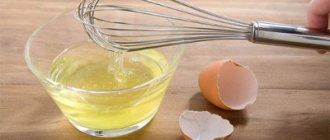Coronavirus has taught even those who for some reason ignored this basic rule to wash their hands. However, the new virus is far from the only reason to practice hygiene. And even if washing your hands was news to someone, then other norms may simply come as a shock - that’s why we decided to talk about them (despite the fact that this topic does not concern sports at all - but it concerns health). Valentin Kovalev, an infectious disease specialist at the Rassvet clinic, told us about the hygiene rules that should be observed in the kitchen.
Scientists have not decided whether eggs should be washed. Cooking them completely is more important
To wash eggs or not is truly Hamlet's question. Previously, it was believed that it was necessary, otherwise there was a high risk of contracting salmonellosis, in particular due to the remnants of chicken droppings on the shell. Salmonellosis is an acute intestinal infection caused by Salmonella bacteria. May lead to diarrhea, increased body temperature, and vomiting. In rare cases - to renal failure.
However, many studies of varying degrees of reliability were later published showing that washing reduces the protective properties of the shell.
However, salmonella is found not only on the shell, but also inside the egg, recalls Valentin Kovalev. Therefore, it doesn’t matter at all whether you wash them or not. The main thing is heat treatment. In this sense, eggs “soft-boiled” or “in a bag” are always a bit of a risk. It is better for children and people with weakened immune systems to bring them to full readiness.
Use of disinfectants
Dirty shells are the main reason why egg products are washed. We have already answered the question whether such a product can be stored.
In America, the goods undergo special processing. Disinfectants remove the shell and the shelf life is shortened to 7 days. Therefore, if you decide to use disinfecting liquids, monitor the shelf life.
Dry method
Before storage, a dry method of cleaning domestic eggs is allowed. After the chickens leave feathers, droppings and other debris in the nest. All these remains of the life activity of the hens stick to the shell. The product has an unaesthetic appearance. But the shelf life of untreated eggs in the nest is considered to be the longest.
To bring the raw product into proper condition, farm owners clean them manually from visible contaminants. It involves removing stuck feathers, droppings, and straw from eggshells.
Traditional methods
People most often wash eggs using detergents:
- Take the soap and dissolve it in warm water until foam forms. Wash the shells carefully. Wipe dry and place in container.
- There is a known method of processing with soda. Baking soda is dissolved in warm water and each testicle is also treated with a napkin. The washed eggs are placed in a container.
- Some housewives resort to vinegar. The essence of the method is to wipe the shell with a dampened cloth.
Remember that wet cleaning methods reduce shelf life. Therefore, eat it as soon as possible.
It is better not to wash raw chicken. Splashes can spread bacteria throughout the kitchen
If washing eggs is a matter of taste, then in the case of raw chicken, experts categorically do not recommend washing it.
What are the dangers of raw chicken? First of all, the same salmonella. Salmonella can be a normal part of the microflora in chickens, notes Valentin Kovalev. However, if they enter the human body, they can cause an acute intestinal infection.
Washing chicken will not get rid of salmonella. On the contrary, along with splashes of water, bacteria can colonize kitchen surfaces that are located next to the sink. Many people have a drying rack for clean dishes right there. This means that there is a risk of bacteria colonizing, for example, a mug or fork.
As for the salmonella in the chicken itself, they will be destroyed during heat treatment. The main thing is to avoid the presence of pink meat and juice.
In the case of beef or pork, pink undercooked meat is mainly a danger to pregnant women as it may be contaminated with the parasite Toxoplasma. Toxoplasmosis is asymptomatic in most cases, but can cause fetal development problems.
In general, any meat should not be washed unless absolutely necessary (for example, something has stuck to it - then wash it off carefully, of course), the main thing is to bring it to readiness.
But it’s unlikely that you won’t be able to wash the fish if you didn’t take a piece of steak, but a carcass that needs to be cut and cleaned. As you know, some types of fish can harbor different types of parasites. Therefore, when working with raw fish, remove clean dishes from the washing and cutting area, and then thoroughly rinse the countertop and sink.
Some useful tips
Useful tips will be useful both for those who eat products from domestic laying hens and for those who buy food in the store. Recommendations will help extend the shelf life and not harm your own health.
For those who have their own birds lay eggs
- If you have a large amount of “harvest” accumulated during the season, and there is not enough space in the refrigerator, proceed as follows:
- Clean the application using a dry method. Take a sheet of newspaper and carefully wrap each copy. Place them neatly in rows into an empty box. Place the filled container in a cool place, away from sunlight. This will significantly increase shelf life.
- Make it a habit to harvest twice a day during hot weather. The eggs will last longer.
- Do not wash finished products before selling. It's better to use the dry method.
- If you accidentally find a nest with a large amount of deposited, then do not rush to eat them. Check if they are damaged. This can be done by dipping a raw egg into salted, cold water. Fresh ones will float, and spoiled ones will fall to the bottom of the container.
The refrigerator is also unsafe. Do not store raw and prepared foods next to each other
You might think that the last bastion of safety in the kitchen is the refrigerator. But no. It turns out that there are bacteria that reproduce best at low temperatures: these are campylobacter and listeria.
Campylobacter is one of the most common causative agents of intestinal infections with vomiting, diarrhea and fever. Listeria can cause not only intestinal infections, but also meningitis and other diseases.
These bacteria can come from raw or undercooked meats, soft cheeses, prepared salads, fresh vegetables and fruits.
To avoid the proliferation of these bacteria, it is necessary to wash the refrigerator more often, throw out expired foods, do not store raw and cooked foods nearby, and also use containers and storage bags to avoid contact transmission of flora. If food is exposed, sooner or later, when you move it, it can touch and allow bacteria to spread.
***
Would you like us to break down other hygiene rules? What other dangers are there in the house? What can you get infected from pets? What microorganisms can be ingested while swimming in lakes and rivers? Write in the comments what topics interest you.
How to properly store chicken eggs
The risk that products will become unfit for food increases if storage conditions are not followed. The factor is influenced by:
- place;
- temperature;
- shell condition.
Usually the product is stored in a refrigerator or at room temperature.
In a refrigerator
A shelf life of up to 3 months is allowed, provided that these are homemade eggs. Store-bought products are stored for no longer than a month.
Please note that the indicated period is for unprocessed domestic varieties in which the protective shell is not damaged.
At room temperature
It is not recommended to store natural products for longer than 25 days, and store-bought ones for no longer than 7 days.
Please note that it is better to place the products in a dark, cool place, packing them in containers.
Do the shelf life differ between washed and unwashed products?
The shelf life of washed and unwashed products differs. The difference is noticeable.
Unwashed: shelf life up to 3 months. This applies to a natural, homemade product. Moreover, the period does not change if a dry cleaning method was used and storage rules were followed.
It is understood that store-bought eggs have already been processed. Typically, disinfectants are used for this. As a result, the protective shell on the shell is destroyed and the shelf life is reduced. On average it ranges from 7 to 30 days. This again depends on the storage conditions.
store-bought eggs undergo mandatory treatment against harmful organisms, so the risk of infection is minimal
Read also
- Should you fast before the New Year's feast? Are caviar sandwiches harmful? How many kilometers on skis will you have to work off for the Olivier?
- PP menu is a balanced menu for every day for a healthy diet. We have collected rules on how to compose it, and examples of diet
- Is falafel an element of street food or a complete dish? What are its benefits for athletes?











